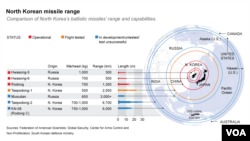The U.N. Security Council has "strongly condemned" North Korea's launch of two medium-range ballistic missiles, saying it clearly violated U.N. resolutions.
In a unanimous statement, the council "expressed grave concern" over the launches it called "unacceptable."
It demanded North Korea refrain from further actions that violate U.N. resolutions and urged all countries "to redouble their efforts" to implement all sanctions against the communist nation.
The statement was adopted during a closed-door meeting called by the United States, and was backed of China, North Korea's ally.
North Korea fired the missiles Friday in defiance of U.N. resolutions prohibiting that country from developing nuclear and ballistic missile capabilities.
South Korean officials said one of the missiles traveled 800 kilometers before crashing off the North's east coast. A second missile disappeared from South Korean radar and appeared to have exploded in flight. Both were believed to be Rodong missiles fired from road-mobile launch vehicles. Rodong missiles have the potential to reach Japan.
North Korea did not declare a no-sail zone prior to the launch, even though it is required under international conventions to warn ships that may be in the area. Neither missile's launch path was assessed to be a threat to the United States or its regional allies, according to the U.S. Defense Department, which tracked the launch of the missiles.
New sanctions
The North's actions came a day after President Barack Obama signed an executive order imposing new sanctions on Pyongyang in response to the reclusive state's latest nuclear and ballistic missile tests.
The executive order followed North Korea's fourth nuclear test January 6, as well as a February 7 long-range rocket launch that was widely seen as a disguised ballistic missile test. Both tests were in violation of long-standing international talks aimed at curbing Pyongyang's nuclear ambitions.
Secretary of State John Kerry issued a statement Friday saying the United States is closely monitoring the situation on the Korean Peninsula. The statement, in part, read, "We call again on North Korea to refrain from actions that further raise tensions in the region and focus instead on taking concrete steps toward fulfilling its international commitments and obligations."
Kerry said the U.S. remained steadfast in its commitments to the defense of its allies, including South Korea and Japan.
WATCH: Video footage of missile launch
Secretary-General Ban Ki-moon called on Pyongyang to "halt these inflammatory and escalatory actions."
Citing the secretary-general, spokesman Stephane Dujarric said, "The situation on the Korean Peninsula, including the latest ballistic missile launches, is deeply troubling," and urged Pyongyang to comply with its international obligations, including relevant Security Council resolutions.
History repeats
Friday's missile launches were the latest retaliatory acts North Korea has made since the United Nations imposed tough new sanctions March 2. They mirrored the North’s response to the last round of U.N. sanctions imposed in 2013 after its third nuclear test.
In May of that year, North Korea launched a series of short-range missiles over one weekend.
Nuclear advancement
This month, North Korean leader Kim Jong Un ordered further nuclear and missile tests. State media KCNA published photographs of Kim inspecting sites where miniaturized nuclear warheads and advanced long-range ballistic missile technologies were supposedly being developed.
The North, however, has yet to demonstrate this type of capability, and many analysts have expressed skepticism that the country’s nuclear program has reached that advanced stage of development.
In 2013, Kim ordered the country's atomic energy department to restart the uranium enrichment plant and the five-megawatt reactor at its Yongbyon nuclear complex. The North closed the facility in 2007 under an agreement reached at six-party talks with the United States, China, Russia, Japan and South Korea.
Continued provocation
The continued repetition of provocation and crises has led many, especially in South Korea, to downplay the reality of North Korea’s nuclear advancement and growing threat to regional peace and stability, said analyst Ahn Chan-il of the World Institute for North Korean Studies in Seoul.
“At this point, it is regrettable that we have become dull on North Korea’s military provocation, which continues to upgrade,” he said.
While the North’s aggressive responses follow the same defiant pattern, advocates for sanctions say there is cause to believe that the new U.S. measures, in addition to the U.N. sanctions imposed this year, will deliver a different outcome.
“I think it is good to see that the Obama administration is imposing actual sanctions and pressure while it had had a naïve policy in the past against North Korea,” Ahn said.
International condemnation
As international sanctions increase economic pressure on Pyongyang, Washington, Seoul and Tokyo have increased their defense readiness postures. U.S. and South Korean forces are currently conducting joint annual military exercises.
“We take the threat [from North Korea] extremely seriously,” U.S. Ambassador to Korea Mark Lippert told VOA Friday by phone, adding that the U.S. was continuing to consult with South Korea on the “desirability and feasibility of deployment” of an anti-ballistic missile system known as Terminal High Altitude Area Defense, or THAAD.
"North Korea's missile launch is a frontal attack against the U.N. Security Council resolution and a significant threat to peace and stability in the international society," said South Korean Defense Ministry spokesman Moon Sang-Gyun.
Japanese Prime Minister Shinzo Abe described the launch as “extremely problematic” and called on the North to cease such actions.
Brian Padden and Youmi Kim in Seoul and Nike Ching in Washington contributed to this report.










